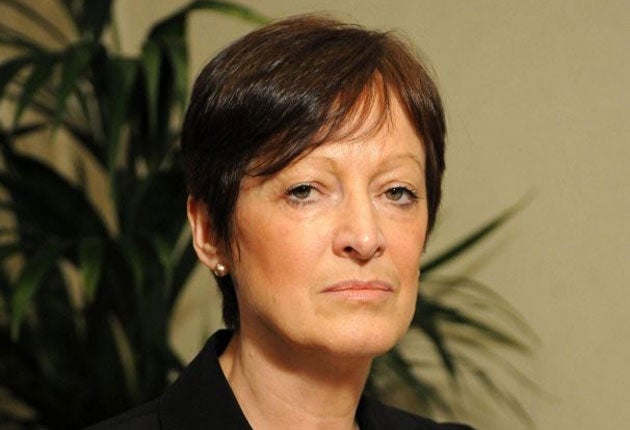Baby P chief's dismissal a 'breach of natural justice'

The former children's services chief who lost her job over the Baby P tragedy was the victim of a "flagrant breach of the rules of natural justice" that left her shocked, ruined her career and led her to thoughts of suicide, the High Court heard today.
Sharon Shoesmith, 56, was dismissed without compensation by Haringey Council in north London in December after a damning report into her department's failings.
Today she launched judicial review proceedings against the council, Children's Secretary Ed Balls and regulator Ofsted at the High Court today.
James Maurici, appearing for Ms Shoesmith, described how she was still recovering from post traumatic shock.
He told Mr Justice Foskett at the High Court in London: "As matters stand the simple fact is the claimant will never work again. She has been financially ruined and her health has been very seriously affected."
Mr Maurici accused Mr Balls of "convicting the claimant with no opportunity whatever to be heard".
Mr Balls sent Ofsted inspectors into Haringey last November after the trial of those responsible for the death of Baby P, who can now be named as Peter Connelly.
The review team identified a string of "serious concerns" about the local authority's child protection services, which they condemned as "inadequate".
Mr Balls removed Ms Shoesmith from her senior post on 1 December and Haringey formally dismissed her a week later.
She attempted to overturn the decision to sack her but a panel of councillors rejected her appeal.
In March Ms Shoesmith lodged an employment tribunal claim for unfair dismissal against Haringey Council and launched her judicial review application.
Peter was just 17 months old when he died in August 2007 at the hands of his mother, Tracey Connelly, her lover, Steven Barker and their lodger, Jason Owen.
He had suffered 50 injuries despite receiving 60 visits from social workers, doctors and police over the final eight months of his life.
A series of reviews identified missed opportunities when officials could have saved the little boy's life if they had acted properly on the warning signs in front of them.
Ms Shoesmith's case at the High Court is expected to last at least three days.
Today Mr Maurici described, as Ms Shoesmith sat behind him, how she had been "deeply shocked and saddened" over the way Baby P's young life was cut tragically short "in utterly horrific circumstances".
The judge was told that Mr Balls made a televised press statement last 1 December in which he announced that he had "summarily decided to remove" Ms Shoesmith from office.
That decision was based on an Ofsted report the Secretary of State had received the night before and an oral presentation made by Ofsted.
Mr Maurici said: "That decision effectively ended, we say, the claimant's employment with Haringey. Indeed, we say it ended her career."
Mr Balls had said in press conferences on several occasions that he judged Ms Shoesmith "not to be fit to hold office".
It was "extraordinary" how the Secretary of State had convicted the claimant with no opportunity whatever to be heard - "there is no doubt that is the case", said Mr Maurici.
Nor was Ms Shoesmith given an opportunity to see the Ofsted report or details of the oral presentation given by Ofsted inspectors on which Mr Balls had acted.
She had had no chance to challenge "a number of highly prejudicial comments made by Ofsted inspectors to the Secretary of State in the course of that meeting".
The report Ofsted produced was itself the result of an inspection which was not carried out in accordance with Ofsted's arrangements for such inspections, said Mr Maurici.
One feature was that Ofsted understood the position to be that there should be "no feedback - formally or informally" to Ms Shoesmith or anyone else at the council relating to the emerging conclusions or hypothesis to which the inspectors were coming.
Normally there was feedback, said Mr Maurici.
On Friday last week a witness statement had been produced on behalf of Mr Balls.
This indicated for the first time that, in so far as Ofsted understood that the Secretary of State had directed "no feedback", it was "labouring under a misapprehension".
Mr Maurici said: "What the Secretary of State now says, as of Friday, is that it was not his intention to prohibit feedback."
But Ofsted had certainly understood that to be what the Secretary of State had asked for, and Mr Maurici suspected Friday's statement "came as much of a surprise to them as it did to us".
Mr Maurici said: "The fact is, two public authorities have been at fundamental cross-purposes.
"As a result, my client's career has been brought to an end in an unfair way."
At the 1 December press conference, Mr Balls made clear that he expected Haringey to get on with what was to be "the mere formality" of dismissing Ms Shoesmith, said Mr Maurici.
"We say the council, in this respect, did the Secretary of State's bidding."
At the heart of Ms Shoesmith's case was "whether a public authority - or public authorities - can exercise powers to end a person's career without affording them a hearing".
Mr Maurici said: "It is a question that admits only one answer."
He said much of the case advanced by the defendants in opposing today's application for judicial review was that, whatever the procedural failings, "there was nothing the claimant could have said that would have affected the outcome - i.e. the summary ending of her career".
The courts were "rightly reluctant to accept such argument", and in the end "all the claimant simply says is that she should have had a chance to put her case before her career was summarily ended".
Bookmark popover
Removed from bookmarks